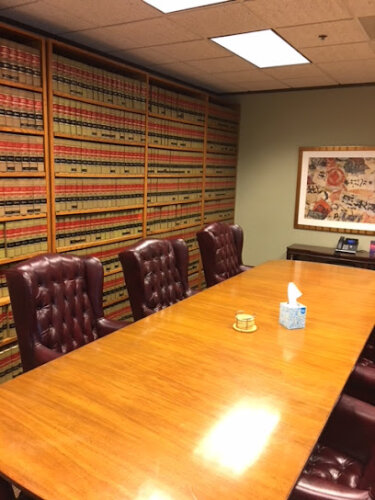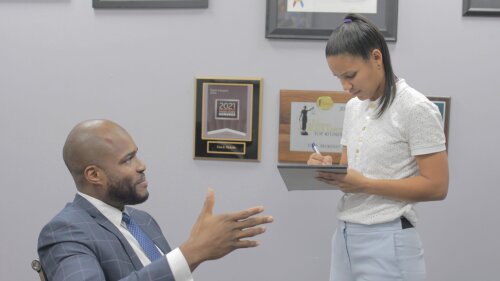Best Communications & Media Law Lawyers in Houston
Share your needs with us, get contacted by law firms.
Free. Takes 2 min.
List of the best lawyers in Houston, United States
About Communications & Media Law in Houston, United States
Communications & Media Law is the area of law that governs how information is created, shared, and consumed through different media channels. In Houston, as with the rest of the United States, this field touches many forms of communication, such as television, radio, newspapers, digital platforms, and social media. It involves federal laws, such as those enforced by the Federal Communications Commission (FCC), along with Texas state regulations. Houston is a major media market with significant corporate headquarters, large broadcasting stations, and a diverse array of content creators. Local legal matters in this field can include freedom of speech, defamation, copyright infringement, advertising regulations, privacy rights, and broadcast licensing, among others.
Why You May Need a Lawyer
There are various situations where individuals or businesses in Houston may need legal assistance with Communications & Media Law matters. Some common reasons include:
- Facing defamation, libel, or slander lawsuits regarding something published or broadcasted
- Dealing with copyright or trademark disputes related to media content
- Negotiating contracts for television, radio, podcasting, or digital media production
- Responding to cease-and-desist letters over online content
- Navigating advertising regulations and compliance with state and federal rules
- Protecting privacy rights or data under federal and Texas law
- Obtaining or maintaining broadcast licenses
- Handling issues related to freedom of speech or press
- Protecting your reputation or your business’s image in media reports
- Responding to government investigations related to media activities
An experienced Communications & Media Law attorney can help protect your rights, ensure compliance, negotiate disputes, and represent your interests in civil litigation or before regulatory agencies.
Local Laws Overview
Houston operates under the jurisdiction of both Texas law and relevant federal regulations that affect communications and media activities. Key aspects of local laws include:
- Defamation and Libel: In Texas, defamation law balances First Amendment protections with the right to protect one's reputation. The Texas Citizens Participation Act is an anti-SLAPP law that provides special procedures for rapid dismissal of meritless defamation lawsuits.
- Public Records and Open Meetings: The Texas Public Information Act and Texas Open Meetings Act create duties for government transparency that can intersect with media reporting and access to records.
- Broadcast Licensing: Local radio and television stations in Houston must comply with FCC requirements, and violation of these laws can bring local consequences.
- Advertising Law: Texas state regulations, along with FTC guidelines, oversee false advertising, commercial speech, and telemarketing rules, which are especially relevant to Houston's robust business environment.
- Privacy and Data Protection: Texas law provides for protection of individual privacy, especially in cases of audio or visual recording without consent, which can affect local journalism and content creation.
- Censorship and Content Restrictions: While the First Amendment broadly protects speech, there are exceptions for obscenity, incitement, or threats under both federal and local law.
- Internet Law: Houston businesses and individuals creating online content are subject to both federal communications laws and Texas regulations regarding online harassment, revenge porn, and data security.
Frequently Asked Questions
What is defamation and how is it handled under Texas law?
Defamation is a false statement presented as a fact that injures someone's reputation. In Texas, defamation includes both libel (written) and slander (spoken). Plaintiffs must prove the statement was false, published to a third party, and caused harm. Texas law also has the Citizens Participation Act, which helps quickly dismiss meritless defamation suits and may allow for recovery of attorney fees.
How do I protect my copyright as a content creator in Houston?
Copyright protection exists automatically when you create an original work fixed in a tangible medium. However, registering your copyright with the US Copyright Office strengthens your ability to enforce your rights in court. A lawyer can assist with registration and enforcement.
What should I do if I receive a cease-and-desist letter regarding my media content?
You should take any legal notice seriously. Do not respond before consulting an attorney. Cease-and-desist letters may signal a potential lawsuit for defamation, copyright, or trademark infringement, so professional guidance is crucial.
Are there special rules for advertising in Texas?
Yes. Texas law prohibits false, misleading, or deceptive advertising. Some industries have additional advertising requirements. Violations can lead to lawsuits, fines, or regulatory action. Always review ad content with legal counsel if you are unsure.
Can I record a conversation or event in Houston for media purposes?
Texas is a one-party consent state, meaning you only need one participant’s consent to record a conversation. However, it is illegal to record if you are not a party to the conversation and have not received consent. Recording video in certain private spaces can also violate privacy laws.
What is considered "public interest" for media reporting in Houston?
Matters involving government actions, public safety, civic affairs, and significant local events are typically considered public interest. Reporting on public interest issues enjoys greater First Amendment protection but does not provide total immunity from legal claims.
How does the FCC regulate local media in Houston?
The FCC oversees broadcast licensing, content standards, emergency communications, and ownership regulations for local radio and television stations. Noncompliance can lead to fines, license suspension, or denial of renewals.
Can online content lead to legal liability in Texas?
Yes. Defamatory, infringing, or false advertising content published online can lead to lawsuits under state or federal law. Social media posts, blog entries, and digital ads are all subject to these regulations.
What rights do journalists have regarding access to records and government meetings?
Journalists in Houston have rights under the Texas Public Information Act to inspect or copy government records, with certain exceptions. The Texas Open Meetings Act provides for open access to governmental meetings, although some sessions may be closed for specified reasons.
What steps should I take if someone publishes false or damaging information about me or my business in the media?
Document the statements, gather evidence of harm, and contact a qualified Communications & Media Law attorney. They can advise you on whether you have grounds for a retraction, apology, or legal action, including a lawsuit if the statements are indeed defamatory.
Additional Resources
If you need further information or support regarding Communications & Media Law issues in Houston, consider these resources:
- Federal Communications Commission (FCC)
- Texas Attorney General - Consumer Protection Division
- Houston Bar Association - Media Law Section
- US Copyright Office
- Texas State Bar - Intellectual Property Law Section
- Texas Public Information Act information from the Texas Attorney General
- National Association of Broadcasters
- Texas Association of Broadcasters
Next Steps
If you are facing a legal issue or simply need advice regarding Communications & Media Law in Houston, the following steps can help you move forward:
- Gather all relevant documents and communications related to your issue
- Make notes about key dates, individuals involved, and any previous attempts to resolve the problem
- Research attorneys in Houston who specialize in Communications & Media Law
- Schedule a consultation to discuss your concerns with an experienced lawyer
- Be prepared to ask questions about the attorney’s expertise, approach, and possible outcomes of your case
- Follow professional legal advice closely to protect your rights and interests
Taking these steps ensures you have the appropriate knowledge and representation to address your Communications & Media Law matter effectively in Houston.
Lawzana helps you find the best lawyers and law firms in Houston through a curated and pre-screened list of qualified legal professionals. Our platform offers rankings and detailed profiles of attorneys and law firms, allowing you to compare based on practice areas, including Communications & Media Law, experience, and client feedback.
Each profile includes a description of the firm's areas of practice, client reviews, team members and partners, year of establishment, spoken languages, office locations, contact information, social media presence, and any published articles or resources. Most firms on our platform speak English and are experienced in both local and international legal matters.
Get a quote from top-rated law firms in Houston, United States — quickly, securely, and without unnecessary hassle.
Disclaimer:
The information provided on this page is for general informational purposes only and does not constitute legal advice. While we strive to ensure the accuracy and relevance of the content, legal information may change over time, and interpretations of the law can vary. You should always consult with a qualified legal professional for advice specific to your situation.
We disclaim all liability for actions taken or not taken based on the content of this page. If you believe any information is incorrect or outdated, please contact us, and we will review and update it where appropriate.















